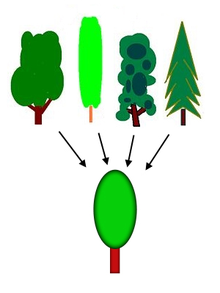Generalization
This article has multiple issues. Please help improve it or discuss these issues on the talk page. (Learn how and when to remove these template messages)
(Learn how and when to remove this template message)
|
| Look up generalisation in Wiktionary, the free dictionary. |
A generalization (or generalisation) is the formulation of general concepts from specific instances by abstracting common properties. Generalizations posit the existence of a domain or set of elements, as well as one or more common characteristics shared by those elements (thus creating a conceptual model). As such, they are the essential basis of all valid deductive inferences. The process of verification is necessary to determine whether a generalization holds true for any given situation.
Generalization is the process of identifying the parts of a whole, as belonging to the whole. The parts, completely unrelated may be brought together as a group, belonging to the whole by establishing a common relation between them.
It must be stated that, the parts cannot be generalized into a whole until a common relation is established among all the parts. But this does not mean that the parts are unrelated, only that no common relation has been established yet for the generalization.
The concept of generalization has broad application in many connected disciplines, sometimes having a specialized context or meaning.
Of any two related concepts, such as A and B, A is a "generalization" of B, and B is a special case of A, if and only if
- every instance of concept B is also an instance of concept A; and
- there are instances of concept A which are not instances of concept B.
For instance, animal is a generalization of bird because every bird is an animal, and there are animals which are not birds (dogs, for instance). (See also: Specialisation (biology)).
Contents
Hypernym and hyponym[edit]
The connection of generalization to specialization (or particularization) is reflected in the contrasting words hypernym and hyponym. A hypernym as a generic stands for a class or group of equally ranked items—for example, tree stands for equally ranked items such as peach and oak, and ship stands for equally ranked items such as cruiser and steamer. In contrast, a hyponym is one of the items included in the generic, such as peach and oak which are included in tree, and cruiser and steamer which are included in ship. A hypernym is superordinate to a hyponym, and a hyponym is subordinate to a hypernym.
Examples[edit]
Biological generalization[edit]
An animal is a generalization of a mammal, a bird, a fish, an amphibian and a reptile.
Cartographic generalization of geo-spatial data[edit]
Generalization has a long history in cartography as an art of creating maps for different scale and purpose. Cartographic generalization is the process of selecting and representing information of a map in a way that adapts to the scale of the display medium of the map. In this way, every map has, to some extent, been generalized to match the criteria of display. This includes small cartographic scale maps, which cannot convey every detail of the real world. Cartographers must decide and then adjust the content within their maps to create a suitable and useful map that conveys geospatial information within their representation of the world.
Generalization is meant to be context-specific. That is to say, correctly generalized maps are those that emphasize the most important map elements while still representing the world in the most faithful and recognizable way. The level of detail and importance in what is remaining on the map must outweigh the insignificance of items that were generalized, as to preserve the distinguishing characteristics of what makes the map useful and important.
Geometric generalizations[edit]
A polygon is a generalization of a 3-sided triangle, a 4-sided quadrilateral, and so on to n sides.
A hypercube is a generalization of a 2-dimensional square, a 3-dimensional cube, and so on to n dimensions.
A quadric, such as a hypersphere, ellipsoid, paraboloid, or hyperboloid, is a generalization of a conic section to higher dimensions.
See also[edit]
| Wikiquote has quotations related to: Generalization |
- Categorical imperative (ethical generalization)
- Ceteris paribus
- Class diagram
- External validity (scientific studies)
- Faulty generalization
- Generic (disambiguation)
- Generic antecedent
- Hasty generalization
- Inheritance (object-oriented programming),
- Mutatis mutandis
- -onym
- Ramer–Douglas–Peucker algorithm
- Semantic compression
- Specialization (logic), the opposite process
- Inventor's paradox
